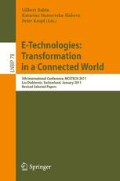Abstract
The paper addresses the issue of communication between a human and a set of distributed agents. The approach consists of two steps: a first step to identify possible actions requested by the human, and a second step where natural language data are interpreted by agents that possibly could execute the selected action. Action selection involves using linguistic cues, processing the input sentence uses ontological cues as well as the knowledge-base structure. The architecture can be extended to information systems, an example of which is given in the paper.
Access this chapter
Tax calculation will be finalised at checkout
Purchases are for personal use only
Preview
Unable to display preview. Download preview PDF.
References
Special issue of AI Magazine on Question/Answering, 31(3) (Fall 2010)
Barthès, J.-P.A.: OMAS - A Flexible Multi-Agent Environment for CSCWD. To appear in Future Generation Computer Systems (2010)
Bettahar, F., Moulin, C., Barthès, J.-P.A.: Ontology support for knowledge management in e-government environments. In: ECAI 2006 - Workshop on Knowledge Management and Organizational Memories, Riva del Garda, Italy, pp. 19–24 (2006)
Chen, K., Barthès, J.-P.: Giving an Office Assistant Agent a Memory Mechanism. In: Proc. ICCI 2008 (2008)
Ferrucci, D., Brown, E., Chu-Carroll, J., Fan, J., Gondek, D., Kalyanpur, A.A., Laly, A., Murdock, J.W., Nyberg, E., Prager, J., Schlaefer, N., Welty, C.: Building Watson: An overview of the DeepQA Project. AI Magazine 31(3), 59–79 (2010)
Knott, A., Vlugter, P.: Multi-agent human-machine dialogue: issues in dialogue management and referring expression semantics. Artificial Intelligence 172(2-3), 69–102 (2008)
Lenat, D., witbrock, M., Baxter, D., Blackstone, E., Deaton, C., Schneider, D., Scott, J., Shepard, B.: Harnessing Cyc to answer clinical researchers’ ad hoc queries. AI Magazine 31(3), 13–32 (2010)
Myers, K., Berry, P., Blythe, J., Conley, K., Gervasio, M., McGuinness, D.L., Morley, D., Pfeffer, A., Pollack, M., Tambe, M.: An Intelligent Personal Assistant for Task and Time Management. AI Magazine 28(2), 47–61 (2007)
Negroponte, N.: Being Digital. Alfred a Knopf Inc., Westminister (1995)
Nguyen, A.: An agent-based approach to dialogue management in personal assistants, PhD thesis, University of New South Wales, Australia (2007)
Paraiso, E.C., Barthès, J.-P.A.: An intelligent speech Interface for personal assistants in R&D projects. Expert Systems with Applications 31, 673–683 (2006)
Quillian, M.R.: Word Concepts: A Theory and Simulation of Some Basic Semantic Capabilities. Behavioral Science 12, 410–430 (1967)
Tur, G., Stolcke, A., Voss, L., Peters, S., Hakkani-Tur, D., Dowding, J., Favre, B., Fernandez, R., Frampton, M., Frandsen, M., Frederickson, C., Graciarena, M., Kintzing, D., Leveque, K., Mason, S., Niekrasz, J., Purver, M., Riedhammer, K., Shriberg, E., Tien, J., Vergyri, D., Yang, F.: The CALO Meeting Assistant System. IEEE Transactions on Audio, Speech, and Language Processing 18(6), 1601–1611 (2010)
Ferrucci, D., Brown, E., Chu-Carroll, J., Fan, J., Gondek, D., Kalyanpur, A.A., Laly, A., Murdock, J.W., Nyberg, E., Prager, J., Schlaefer, N., Welty, C.: An overview of the DeepQA Project. AI Magazine 31(3), 59–79 (2010)
Wong, A., Nguyen, A., Wobcke, W.: Robustness of a spoken dialogue for a personal assistant. In: Proc. of the 2007 IEEE/WIC/ACM International Conference on Intelligent Agent Technology, pp. 123–127. IEEE Computer Society, Los Alamitos (2007)
Author information
Authors and Affiliations
Editor information
Editors and Affiliations
Rights and permissions
Copyright information
© 2011 Springer-Verlag Berlin Heidelberg
About this paper
Cite this paper
Barthès, JP.A. (2011). Flexible Communication Based on Linguistic and Ontological Cues. In: Babin, G., Stanoevska-Slabeva, K., Kropf, P. (eds) E-Technologies: Transformation in a Connected World. MCETECH 2011. Lecture Notes in Business Information Processing, vol 78. Springer, Berlin, Heidelberg. https://doi.org/10.1007/978-3-642-20862-1_9
Download citation
DOI: https://doi.org/10.1007/978-3-642-20862-1_9
Publisher Name: Springer, Berlin, Heidelberg
Print ISBN: 978-3-642-20861-4
Online ISBN: 978-3-642-20862-1
eBook Packages: Computer ScienceComputer Science (R0)

